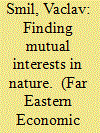| Srl | Item |
| 1 |
ID:
091043


|
|
|
|
|
| Publication |
2009.
|
| Summary/Abstract |
During the 1950s, Stalinist planners (whose modest slogan was "We order the wind when to blow, the rain when to fall!") wanted to flip the direction of several voluminous north-flowing rivers of Western Siberia (Irtysh, Ob, Yenisei) and use them to change the Soviet Central Asia into an irrigated communist paradise. Fortunately, Stalin died and Khrushchev had other problems, but before 1960, the megaproject propensities of the Soviet experts working in Mao's China left a deep imprint on China's water engineers. Soviet experts helped plan a number of audacious water projects but only one, the first dam across the Huanghe, or Yellow River, at Sanmenxia, was completed before their withdrawal. The dam turned out to be a major disaster, and the rapid silting of the reservoir was solved years later only by creating large outlets at the dam's bottom and drastically reducing its electricity-generating capacity.
|
|
|
|
|
|
|
|
|
|
|
|
|
|
|
|
| 2 |
ID:
121985


|
|
|
|
|
| Publication |
2013.
|
| Summary/Abstract |
From the end of the fifteenth century, the Ming state redirected the entire flow of the Yellow River into the course of the Huai River in order the facilitate the transport of tribute grain. This shifted the major problems of water control from the middle and lower reaches of the Yellow River to the Huaibei region. Huaibei was viewed as 'a local interest', as opposed to the 'general interests' represented by the central government, and was sacrificed for those general interests. These policies, which were continued under the Qing dynasty, created widespread and frequent flooding in the region, causing short-term famine and destruction and leading to long-term economic decline.
|
|
|
|
|
|
|
|
|
|
|
|
|
|
|
|